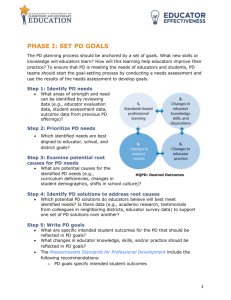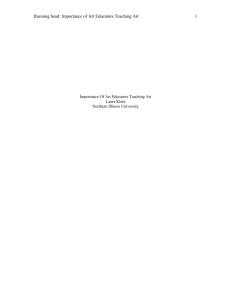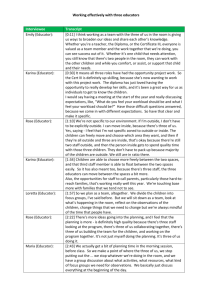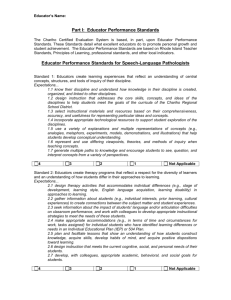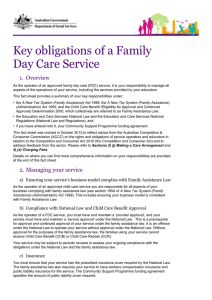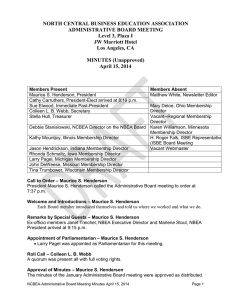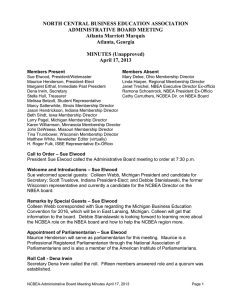NABTE Kiosk - The National Association for Business Teacher
advertisement
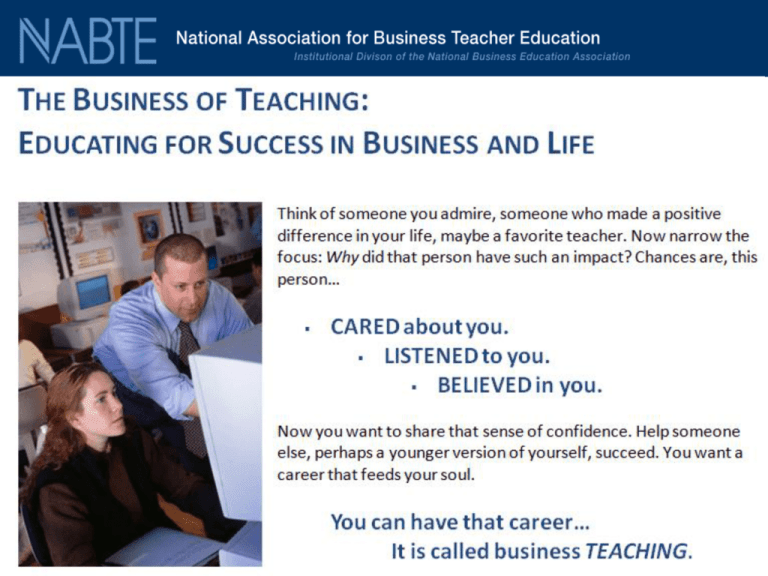
SHELLY MOWINKEL, Milford Public Schools in Milford, Nebraska. As a newly minted business educator, Mrs. Mowinkel chose to transform her role as classroom teacher to knowledge facilitator, and her classroom from one of isolation into one where students engage with the outside world. Her students use tablets to learn and collaborate with each other. They become content creators, not just content consumers, producing digital citizenship presentations, podcasts, and websites—and sharing their work with real-life audiences. DENNIS R. KREJCI, Tri County High School in DeWitt, Nebraska. Mr. Krejci's “leadership through service” ethic reaches beyond his school to professional organizations. “[Professional] meetings provided me with great opportunities to network, as well as to learn new strategies from veteran teachers,” he says. He has contributed to multiple organizations in numerous roles: committee member, newsletter editor, task force member, officer, and executive board member. Mr. Krejci's passion for business education and his willingness to be involved inspires colleagues and students alike. KIMBERLY A. SCHULTZ, Kirkwood Community College, Cedar Rapids, Iowa. Mrs. Schultz raises the bar for professionals in her field. She is an accomplished educator, an expert on assessment, a visionary leader, a tireless advocate for business education, and a dedicated role model. A believer in authentic assessment, Mrs. Schultz's classroom simulates the work environment. She favors project-based instruction over tests, and meaningful feedback from industry professionals over grades alone. One student told her, “My perfect description [of what you do] would be ‘tough love.’ You are always willing to help but you aren’t going to make it easy on us.” BARBARA E. HAGLER, Southern Illinois University, Carbondale, Illinois. Barbara Hagler has made a career of saying “Yes!” to business education, and the profession has been richer for it. She has presented at national conferences, served as a reviewer for journals and NBEA yearbooks, and held local and national office. She has written for such publishers as Pearson and IGI Global, and has published numerous articles in the Business Education Forum, Journal of Research in Business Education, the NBEA Yearbook, and the Business Teacher Education Journal. She is recognized as an expert in technology, research methodology, online learning, and assessment. KELLY SCHOLL, Business Education Supervisor, North Dakota Department of Career and Technical Education, Bismarck, North Dakota. Ms. Scholl has been involved in business education since she was a teenager. As a professional, she has continued to be recognized for her achievements as a business educator at the high school, college, and state levels, and for her service to the field, the profession, and the business education community. Kelly Scholl's colleagues praise her active participation in professional associations. She willingly takes on leadership roles such as planning, developing, and managing statewide FBLA and PBL conferences—and collaborating on the delivery of an annual professional development conference for her state’s CTE teachers. 10 THINGS BUSINESS TEACHERS GET FOR THEIR EFFORTS The chance to stay up-to-date on the latest technology and business trends, which doubles your employment options: you can work as a teacher or as a businessperson in virtually any industry, based on your area of expertise (accounting, marketing, information systems, management, economics and personal finance, etc.). Rarely, if ever, having to answer the question, "Why are we doing this?" or "When will we ever use this?” Students want to be in your classes because what you are teaching relates to everyday life. The privilege of teaching what you do best, in an environment where every day is different. Bored? Never! Work schedules that are compatible with family life. Respect from the business community for your organizational skills, your expertise in training employees, and your ability to speak the language of business. The opportunity to be actively involved—no sitting behind a desk all day—with people who love students, love learning, and love life. Instant rewards: your amazement at seeing the skills your students have learned in such a short time, and their pride in mastering those skills. The chance to belong to a supportive and respected professional team, working alongside colleagues who generously help you develop into the best teacher you can be: by listening, sharing ideas, or mentoring. Students who come back to thank you for what they learned in your class. What you cannot get anywhere else: the chance to help someone believe in himself. EMPLOYMENT FORECAST: BUSINESS TEACHER Georgetown Public Policy Institute (2013) projects occupations in sales and office support will see the largest increase in number of jobs by 2020, while managerial and professional office occupations ranked as the 4th largest growth area. Business educators play a critical role in preparing individuals for these careers. By 2022, the U.S. Department of Labor projects the number of teaching jobs in career and technical education, of which business education is a part, will increase by 9.0% In the business education field specifically, half of all business educators teaching today are expected to retire in the next decade. Need for Business Educators. The business world is calling for a renaissance worker: Someone with the smarts to solve problems rationally and effectively, whether on a local or national level; the literacy and flexibility to successfully deal with ever-changing technology; and the creativity and leadership to help companies compete in the world economy. EMPLOYMENT FORECAST: BUSINESS TEACHER Salaries. The National Education Association reported beginning teachers earn an average starting salary of $36,141 (2013). The national median annual salary for all teachers is $55,050, with the top 10 percent of teachers earning more than $85,690 (Occupational Outlook Handbook, 2014-2015). Of course, salaries vary by state and school district. The longer you teach and the more education you have, the more you are paid. Taking on additional responsibilities, such as advising student groups and extracurricular activities or serving as a department chair, can also increase your salary. IS BUSINESS EDUCATION RIGHT FOR YOU? Effective business educators come in all shapes and sizes and from all kinds of backgrounds. Yet they share certain traits that help them succeed. For instance, business educators teach, coach, motivate, and inspire. Many classrooms are becoming less structured, more relaxed, as students and teachers work to discuss and solve problems together. Business education, with its emphasis on real-time learning and real-world relevance, can be a great opportunity for someone who: Cares about helping young people make career choices. Is passionate about working with students and with business professionals to make learning more relevant. Likes finding creative ways to teach students what they want and need to know. Has lots of energy and patience. Likes reading and learning about business topics. Wants to teach others what she or he has learned. Has or could develop strong technology skills. Is a risk taker who thrives on trying new things. Can do, and enjoys, multitasking. Is organized, committed, and focused, and does not want to sit at a desk all day. Is a person who invents possibilities and wants to be part of a dynamic, ever-changing environment. Values variety and a career that offers multiple job options. Wants to join a professional learning community that strives for excellence. WHAT ARE YOUR NEXT STEPS? Imagining yourself as a business educator is the first step to becoming one. But where do you go from there? If you are in high school, visit your business teacher or your guidance counselor and say that you are interested in pursuing a career in business education. Ask for advice about the best courses for you. Seek job opportunities that will give you practical business experience. If your school participates in Future Business Leaders of America (FBLA) or Business Professionals of America (BPA), join. Finally, begin learning about which colleges or universities offer accredited business education programs. If you are in college, seek out a professor of business education and make your intention known. If your school does not have a business teacher education department, contact the National Business Education Association (www.nbea.org) to find out more about what you can do and where you can go to get the credentials that will allow you to become a business educator. On the practical side, you may qualify for federal financial aid loans and grants, state government loans, college and university-funded aid, or privately funded aid programs to finance your education. If you enter the teaching profession, some states offer "forgivable" loans, depending on where and what you teach after you graduate. Expanding your knowledge. After teaching for a few years, you might decide to continue your education as a graduate student, working with a faculty advisor to get the training you need to teach business education in a community college (a master's degree) or university (a doctoral degree). There you might opt to combine your teaching career with a consulting position in industry. Alternate career paths. If and when you are ready for a break from the classroom, many paths are open to you, including corporate training, management, organizational development, and instructional design for performance improvement. Many of these opportunities will be in traditional face-to-face environments, but some might exist in virtual, or electronic, learning formats.
